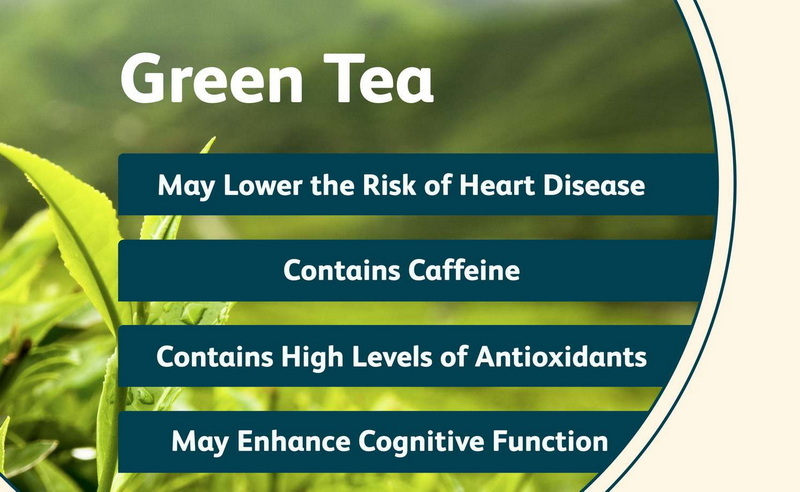Content Menu
● Understanding Green Tea Extract
● Benefits of Green Tea Extract
● The Science Behind Green Tea Extract
● Side Effects of Excessive Green Tea Extract
>> 1. Liver Damage
>> 2. Gastrointestinal Issues
>> 3. Caffeine Sensitivity
>> 4. Headaches
>> 5. Potential Drug Interactions
● Recommended Dosage
● Personal Experiences with Green Tea Extract
● Conclusion
● FAQ
>> 1. What are the main health benefits of green tea extract?
>> 2. How much green tea extract is considered safe?
>> 3. Can green tea extract cause liver damage?
>> 4. What side effects should I be aware of?
>> 5. Is it safe to take green tea extract with medications?
● Citations:
Green tea extract, derived from the leaves of the *Camellia sinensis* plant, is celebrated for its health benefits, including weight loss, improved brain function, and antioxidant properties. However, excessive consumption can lead to serious health risks. This article explores the potential dangers of consuming too much green tea extract, focusing on its side effects, particularly concerning liver health.

Understanding Green Tea Extract
Green tea extract is a concentrated form of green tea that contains high levels of catechins, particularly epigallocatechin gallate (EGCG), which is responsible for many of its health benefits. While moderate consumption is generally safe and beneficial, high doses can lead to adverse effects.
Benefits of Green Tea Extract
Before diving into the potential risks, it's essential to acknowledge the numerous benefits associated with green tea extract:
- Antioxidant Properties: Rich in antioxidants that combat oxidative stress and may reduce the risk of chronic diseases.
- Weight Loss: Some studies suggest that it can aid in weight management by increasing metabolic rate.
- Heart Health: It may help lower cholesterol levels and improve overall cardiovascular health.
- Brain Function: Research indicates potential neuroprotective effects that could reduce the risk of neurodegenerative diseases.
The Science Behind Green Tea Extract
The active compounds in green tea extract, particularly catechins and caffeine, contribute to its health-promoting effects. Catechins are a type of flavonoid with potent antioxidant properties. They help neutralize free radicals in the body, reducing oxidative stress and potentially lowering the risk of chronic diseases such as cancer and heart disease.
Caffeine, on the other hand, is a well-known stimulant that can enhance mental alertness and physical performance. The combination of catechins and caffeine in green tea extract has been shown to improve fat oxidation during exercise, making it a popular supplement among fitness enthusiasts.

Side Effects of Excessive Green Tea Extract
Despite its benefits, too much green tea extract can lead to several side effects:
1. Liver Damage
One of the most concerning risks associated with high doses of green tea extract is hepatotoxicity. Studies have reported cases where individuals experienced liver damage after consuming concentrated forms of green tea extract, particularly at doses exceeding 800 mg of EGCG per day. Symptoms may include:
- Jaundice (yellowing of skin and eyes)
- Nausea
- Abdominal pain
- Fatigue
A notable case involved a young woman who developed acute liver failure after taking high-dose green tea extract supplements. This incident underscores the importance of moderation and awareness regarding dosage.
2. Gastrointestinal Issues
Excessive intake can lead to gastrointestinal discomfort such as nausea, vomiting, diarrhea, and abdominal pain. These symptoms are often exacerbated when green tea extract is consumed on an empty stomach. The tannins present in green tea can irritate the stomach lining, leading to discomfort.
3. Caffeine Sensitivity
Green tea contains caffeine, which can cause side effects like insomnia, anxiety, irritability, and palpitations in sensitive individuals. High doses can amplify these effects significantly. For instance, someone who typically consumes caffeine from coffee might find that adding green tea extract pushes their total intake beyond a comfortable level.
4. Headaches
Some people may experience headaches due to caffeine content or other compounds in green tea extract. This is particularly true for those who consume it in large amounts or are not accustomed to caffeine.
5. Potential Drug Interactions
Green tea extract can interact with various medications, including anticoagulants (blood thinners) and certain antidepressants. This interaction may alter the effectiveness of these drugs or increase the risk of side effects. For example, green tea may inhibit the metabolism of warfarin (a common anticoagulant), leading to increased bleeding risk.
Recommended Dosage
To enjoy the benefits while minimizing risks, it's crucial to adhere to recommended dosages. Generally, consuming up to 300 mg of EGCG per day through supplements is considered safe for most adults. However, those consuming green tea infusions typically receive lower amounts (90-300 mg) without adverse effects.
The method of consumption also matters; drinking brewed green tea poses less risk than taking concentrated extracts or supplements. It's also advisable to consult with a healthcare provider before starting any supplementation regimen.
Personal Experiences with Green Tea Extract
Many individuals report positive experiences with green tea extract when taken in moderation. For instance:
- Weight Loss Success: Some users have noted significant weight loss when combining green tea extract with a balanced diet and regular exercise.
- Enhanced Focus: Others have experienced improved focus and mental clarity during tasks requiring concentration.
However, there are also cautionary tales from those who have overdone it:
- Liver Health Scares: A few users shared their experiences with liver issues after taking high doses without medical supervision.
- Gastrointestinal Distress: Many reported digestive discomfort when taking extracts on an empty stomach or exceeding recommended dosages.
These anecdotes highlight the importance of moderation and individual tolerance levels.
Conclusion
While green tea extract offers numerous health benefits, excessive consumption poses significant risks, particularly concerning liver health and gastrointestinal comfort. It is vital for consumers to be aware of these potential dangers and consult healthcare professionals before starting any supplementation regimen.

FAQ
1. What are the main health benefits of green tea extract?
Green tea extract is rich in antioxidants and has been associated with weight loss, improved heart health, and enhanced brain function.
2. How much green tea extract is considered safe?
Most experts recommend not exceeding 300 mg of EGCG per day from supplements to avoid adverse effects.
3. Can green tea extract cause liver damage?
Yes, high doses of green tea extract have been linked to liver damage in some individuals.
4. What side effects should I be aware of?
Common side effects include gastrointestinal issues (nausea, vomiting), headaches, and symptoms related to caffeine sensitivity (insomnia, anxiety).
5. Is it safe to take green tea extract with medications?
It can interact with certain medications; therefore, consulting a healthcare provider before combining them is advisable.
Citations:
[1] https://www.urmc.rochester.edu/encyclopedia/content?contenttypeid=19&contentid=greenteaextract
[2] https://senchateabar.com/blogs/blog/green-tea-side-effects
[3] https://pmc.ncbi.nlm.nih.gov/articles/PMC7009618/
[4] https://www.healthline.com/nutrition/10-benefits-of-green-tea-extract
[5] https://abc7.com/green-tea-consumer-reports-extract-powder/1782986/
[6] https://www.vumc.org/poison-control/toxicology-question-week/march-12-2021-what-are-adverse-effects-green-tea-extract
[7] https://www.shape.com/healthy-eating/healthy-drinks/too-much-green-tea-or-matcha-could-lead-liver-damage
[8] https://www.webmd.com/vitamins/ai/ingredientmono-960/green-tea
[9] https://www.medicalnewstoday.com/articles/269538






























